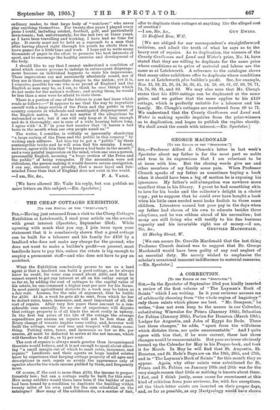[To THE EDITOR OF THE specrxron.1 Sia,Having just returned from
a visit to the Cheap Cottages Exhibition at Letchworth, I read your article on the awards with great interest (Spectator, September 23rd). While agreeing with much that you say, I join issue upon your statement that it is conclusively shown that a good cottage can be built for a labourer and his family for £150 by a landlord who does not make any charge for the ground, who does not want to make a builder's profit—en passant, most landlords have to pay this, unless the estate is big enough to employ a permanent staff—and who does not have to pay an
architect.
What the Exhibition conclusively proves to me as a land agent is that a landlord can build a good cottage, as he always knew he could, for some sum round about £200, and that he cannot expect to get any interest at all on his outlay except in so far as, by adding the cost of cottages to the capital value of his estate, he can command a higher rent per acre for his farms. In most purely agricultural districts 2s. a week may be taken as a fair rent. Assume, for the sake of argument, that he builds for £150. At 2s. a week he gets £5 4s. rent, from which he has to deduct rates, taxes, insurance, and, most important of all, the cost of repairs. After very few years these amount to a con- siderable sum annually, for no one of experience will dispute that cottage property is of all kinds the most costly in upkeep. In the first ten years of the life of the cottage the average expenditure per annum on repairs will not be less than £2. Every change of tenants implies some outlay, and, however well built the cottage, wear and tear and tempest will claim some- thing. Putting rates, taxes, and insurance as 'low as 20s. per annum, £3 must be deducted to arrive at the net income, which will therefore be £2 4s., or 11 per cent.
_ The cost of repairs is always much greater than inexperienced theorists would believe, and it is not enough to speak about allow- ing "a small margin out of which to meet rates, insurance, and iepairs." Landlords and their agents on large landed estates know by experience that keeping cottage property of all ages and descriptions in such repair as avoids the appearance only of squalor absorbs the whole income yielded by them, and frequently more.
Of course, if the cost is more than £150, the income is propor- tionately less ; but can a cottage really be built for this sum? How. many exhibits would there have been if the builder of each had been bound by a condition to duplicate the building within, twenty miles of his own yard for the sum scheduled on the catalogue ? How many of the exhibitors do, as a matter of fact, --I am, Sir, &c., 52 Bedford Row, W.C. GUY Emma.
[We are obliged for our correspondent's straightforward criticism, and admit the truth of what he says as to the heavy cost of repairs. As to duplication, the winners of the County Gentleman and Land and Water's prize, No. 14, have stated that they are willing to duplicate for the same price where conditions as to price of material and labour are the same as at Letchworth. A reference to the catalogue shows that many other exhibitors offer to duplicate where conditions are as at Letchworth plus builder's profit. See, for example, Nos. 15, 19, 25, 26, 34, 36, 38, 45, 54, 59, 60, 61, 67, 69, 70, 71, 74, 76; 80, 81, and 83. We may also note that Mr. Clough states that his £100 cottage can be duplicated at the same price, and we gather that the same applies to his £120. cottage, which is perfectly suitable for a labourer and his, family. Mr. Clough's cottages are numbered from 69 to 71. We understand that the County Gentleman and Land and, Water is making specific inquiries from the prize-winners as to duplication, and hopes to publish the replies shortly. We shall await the result with interest.—ED. Spectator.]










































 Previous page
Previous page